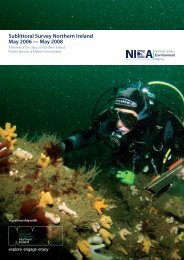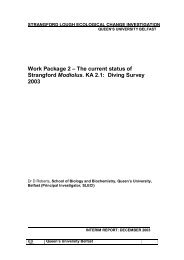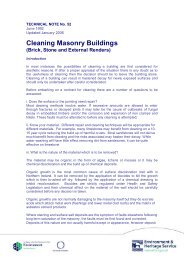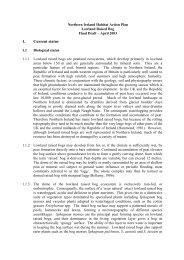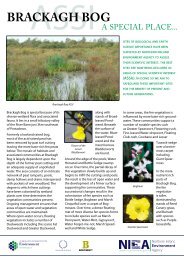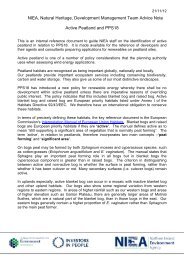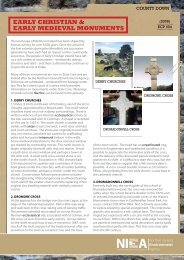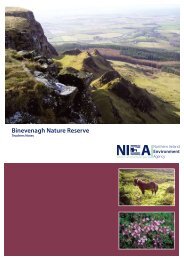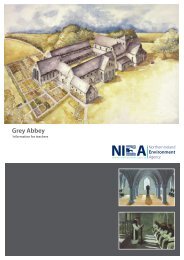Municipal Waste Data Monitoring and Reporting: Interim Guidelines
Municipal Waste Data Monitoring and Reporting: Interim Guidelines
Municipal Waste Data Monitoring and Reporting: Interim Guidelines
You also want an ePaper? Increase the reach of your titles
YUMPU automatically turns print PDFs into web optimized ePapers that Google loves.
2 THE NEED FOR WASTE DATA REPORTING<br />
2.1 EHS REQUIREMENTS<br />
The Department has a statutory duty to make <strong>and</strong> deliver policy to meet UK<br />
<strong>and</strong> EU obligations. The <strong>Waste</strong> Management Strategy (WMS) <strong>and</strong> <strong>Waste</strong><br />
Management Plans (WMPs) are the key elements of that policy <strong>and</strong> the<br />
performance of Northern Irel<strong>and</strong> (NI) as a whole will be measured against the<br />
promises <strong>and</strong> commitments of both the WMS <strong>and</strong> WMPs. The Department,<br />
therefore, has a need for information on a regular basis to carry out its<br />
functions under the <strong>Waste</strong> <strong>and</strong> Contaminated L<strong>and</strong> (NI) Order 1997. This<br />
includes, for instance, information to:<br />
• Demonstrate implementation of waste policy<br />
• Identify potential problems with meeting targets <strong>and</strong> enable effective <strong>and</strong><br />
timely response to these, working in conjunction with the <strong>Waste</strong><br />
Management Groups <strong>and</strong> individual District Councils as appropriate.<br />
• Demonstrate accountability of public funds allocated for the<br />
implementation of WMPs.<br />
• Inform new policy <strong>and</strong> policy reviews e.g. biodegradable waste strategy,<br />
WMS review, policy on packaging waste, hazardous waste, End of Life<br />
Vehicles (ELVs) <strong>and</strong> <strong>Waste</strong> Electrical <strong>and</strong> Electronic Equipment (WEEE)<br />
etc.<br />
The timetables for these <strong>and</strong> implications for NI if targets are not met are such<br />
that reliance on the current District Council annual returns over the next few<br />
years will not be sufficient. More frequent reporting of interim data will be<br />
essential to guide policy decisions <strong>and</strong> meet statutory reporting requirements<br />
in a number of critical areas.<br />
In addition to data reporting on a sub-regional waste management planning<br />
Group basis, it is important that District Council level information is made<br />
available to the Department. <strong>Waste</strong> management is currently organised <strong>and</strong><br />
implemented at the District Council level as a statutory function under the<br />
<strong>Waste</strong> <strong>and</strong> Contaminated L<strong>and</strong> (NI) Order 1997. It is therefore appropriate,<br />
initially, to compare best practice <strong>and</strong> performance at this level. Furthermore,<br />
the Department is accountable for grants allocated to District Councils <strong>and</strong> is<br />
unable to rely solely on aggregated responses when reviewing performance.<br />
Future decisions on the Best Practicable Environmental Option for waste<br />
management on a NI-wide basis need to be informed by the component parts,<br />
as well as the 3 <strong>Waste</strong> Management Groups as a whole. It is possible that the<br />
current groupings may not be the most appropriate arrangements for longterm<br />
targets, especially when considering the need <strong>and</strong> location of major<br />
recovery facilities by 2005.<br />
As the <strong>Waste</strong> Management Groups become established as entities <strong>and</strong> the NI<br />
base data more comprehensive <strong>and</strong> reliable, the Department will review<br />
MUNICIPAL WASTE DATA MONITORING AND REPORTING: INTERIM GUIDELINES 3




